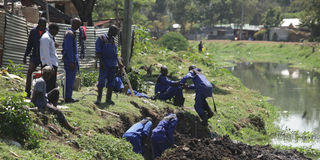Happening Now: Trump takes the lead in US presidential race
Why fish from Kisumu could be contaminated

Kisumu Water and Sanitation Company workers repair one of the pipes that have been discharging raw sewer into river Wigwa which drains its waters into Lake Victoria in this picture taken on October 18, 2022.
Guests and locals in Kisumu could be consuming contaminated fish caused by the release of raw effluent into Lake Victoria.
The raw sewage finds its way into the lake through River Wigwa.
The discovery comes barely a month after a sewer pipe burst and emptied its contents into the lake for over a week.
The pipes belong to the city’s main water supplier, the Kisumu Water and Sanitation Company (KIWASCO).
“We have a third leakage within a month at the same point and are unsure if this is indeed an accident or the pipes are emptied into the lake intentionally,” said Nyalenda resident Charles Otieno.
In the most recent incident, broken pipes for untreated sewage were left running for an hour, emptying their contents into River Wigwa, a source of livelihoods for most residents.
“The sewage lines often break during the day or late in the evening when very few people can notice, with a massive effect on the water bodies,” continued Mr Otieno.
Mr Martin Osuro, another resident, said: “Our biggest fear is that the polluted environment is putting the lives of residents at risk, including those who consume the water and fish from the lake in different places.”
The stench and green water
The sewage pollution has made the river’s water green, with residents lamenting that fish often from the lake have a stench.
Animals also drink the polluted river water, endangering their lives.
The stench from the river has also been cited by eatery owners as discouraging customers and tourists from visiting fish-cooking sites.
Locals blame the stench on sewage pollution even as experts attributed the bad smell to rotten hyacinth in the lake.
“The water provider is putting our lives at risk. Residents risk contracting waterborne diseases over something that could have been sorted out a long time ago,” said Ms Mercy Ogolla.
National Environment Management Authority (Nema) Kisumu County boss Tom Togo, for his part, said sewage pollution affects aquatic life and the lives of those who consume the fish.
“The matter has been brought to my attention and we are working with KIWASCO to find a long-term solution to the challenge,” said Mr Togo, adding that the water firm blamed vandalism for the broken pipes.
KIWASCO Managing Director Thomas Odongo said his team always responds to reports of broken pipes and repairs them promptly.
He admitted that they haven’t found a permanent solution for the problem, which he blamed on increased pressure.
“Occasionally, we may experience the pipe bursts due to high pressure but ours is to swing into action when notified by members of the public,” he said.





